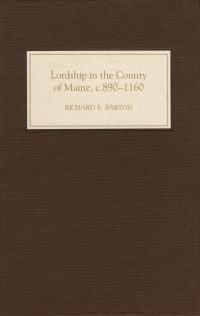
FACULTY & STAFF

Dr. Richard E. Barton
Contact Information
Email: rebarton@uncg.edu
Office: MHRA 2115
Office Phone: 336-334-3998
Education
Ph.D., University of California, Santa Barbara, 1997
M.A., University of California, Santa
Barbara, 1990
B.A., Williams College, 1988
Academic Positions
Associate Professor, University of North Carolina at Greensboro, 2004-
Assistant Professor, University of North Carolina at Greensboro, 1998-2004
Lecturer, Yale University, 1997-98
Part-Time Lecturer, University of California at Santa Barbara, 1996-97
Research Interests
- Central Medieval Europe, 950-1250
- Western France (Anjou, Maine, Normandy)
- Emotions
- Violence
- Bishops and Cathedral chapters
- Charters and diplomatic
Listen to an interview with Dr. Barton:
Current Project
My research program investigates the structures and nature of power in the aristocratic society of western France between c.900 and c.1200. For medieval aristocrats, power may have seemed a relatively uncomplicated concept: it was literally the ability to dominate lesser men and women. Yet my work broadens the concepts of power, domination, and lordship to include interpersonal dynamics, gender constraints, emotional display and convention, collectively held beliefs and identities, and affective notions of right. What this means, of course, is that I combine in my conception of medieval aristocratic power two notions: a practical understanding of power as the ability to constrain and a more theoretical understanding of power as the confluence of intangible qualities of affect, honor, and/or "charisma."
My research is focused on Western France - including Maine, Anjou, the Touraine, the Vendômois, western Brittany, and Normandy - between c.900-1200 (I have also done some work on the early history of Norman England, but this is not a true research specialty). I make use of chronicles, letters, saints' lives, and early chansons de geste, but most of my work involves the analysis of charters (or diplomas, "acta," or "notices") and chronicles.
As one expression of these general concerns, I am completing a book project entitled Representing Anger in the Central Middle Ages. In it I describe and explain several of the most prominent discourses available to medieval authors who chose to write about anger. I then examine chronicles, charters, legal texts, and selected treatises in order to demonstrate how the varied approaches to anger could be used to shape readers' understanding of four essential aspects of medieval social practice: gender norms, political power, disputing, and violence.
Courses Taught
- HIS 221: The Medieval Legacy - A survey of events and culture in Europe between 500 and 1500 CE.
- HIS 310: Daughters of Eve, Sisters of Mary: Women in the Middle Ages - Examines the experiences of women in medieval Europe (500-1500), with specialfocus on gender analysis and close reading of texts by and about women.
- HIS 312: The Crusades - Examines the events of the crusades between 1050 and 1300 as well as the juxtaposition of Christian and Muslim cultures in the Middle East and elsewhere.
- HIS 373: England to 1660 - Survey of political, religious and social developments of Medieval, Tudor and early Stuart England.
- HIS 391: Historical Skills and Methods - Focuses on developing methods of analyzing primary and secondary sources, assembling bibliographies, and preparing a prospectus for a research project. Topic through which these skills are developed vary, but may include the Twelfth Century Renaissance or the Reign of King Stephen.
- HIS 393: Medieval Church and State - Studies the theory and practice of politics in the Middle Ages (500-1500), with special emphasis on the significance of the struggles between the institutional church and European monarchs.
- HIS 510: Historiography – Surveys a variety of different methodologies employed by historians since 1900. A required MA level course.
- HIS 511B: Seminar in Historical Research and Writing: The Impact of the Norman Conquest of England - A seminar designed to produce a major research paper on the topic under study. Currently my topic is the impact of the Norman Conquest on England (1066-1215).
- HIS 542: Medieval History: Selected Topics. Extensive reading in the scholarly literature and primary sources for a specific period or topic from the Middle Ages. Possible topics include the World of Gregory of Tours or Violence in the Middle Ages or Emotions in the Middle Ages.
- HIS 705: >Colloquium in European History to 1789 - Introductory graduate course designed to introduce students to major themes andmethods practiced by historians who study Europe before 1789.
- HIS 709: Introductory Research Seminar: the Impact of the Norman Conquest of England - A graduate-level research course, in which students produce a major paper on the topic under study. Currently the topic is the impact of the Norman Conquest of England (1066-1215).
- HIS 740: Topics in European History. I vary the topic of this course when I teach it. Recent topics have included: "Emotion and Power in the Middle Ages" (2007), and "Interpreting the Crusades" (2008).
Selected Publications

- Lordship in the County of Maine, c.890-1160 (Boydell, 2004)
- "Giving and Receiving Counsel: Forging Political Culture in Western French and Anglo-Norman Assemblies," History: the Journal of the Historical Association 102 (2017)
- "Production documentaire et pouvoir épiscopal au Mans dans l'épiscopat de Guillaume de Passavant (1144-1187), Écrire dans l'ombre des cathédrales, ed. G. Combalbert et C. Senséby, Presses Universitaires de Rennes, forthcoming.
- "Hildebert de Lavardin, un administrateur avisé du diocèse du Mans," 167-180. In Autour de Lanfranc (1010-2010), ed. J. Barrow, F. Delivré, and V. Gazeau (Caen: Presses Universitaires de Caen, 2015).
- "Emotions and Power in Orderic Vitalis," Anglo-Norman Studies 33 (2011 for 2010): 41-59
Selected Awards and Honors
- Delbert McQuaide Distinguished Lecturer in History, Juniata College, November 2007
Master's Research Projects Directed
- Representations of Violence in Late Antique Narrative Sources (2017-18)
- The Political Use of Omens and Portents in Anglo-Norman Narrative Sources (2015-16)